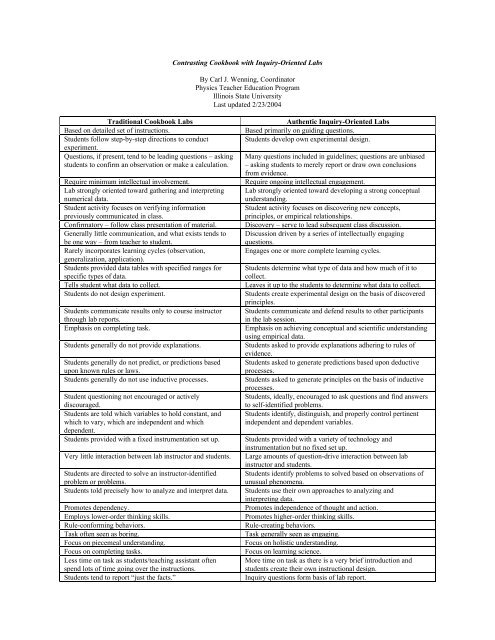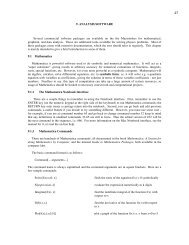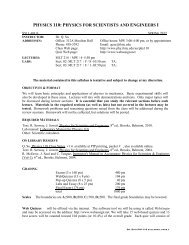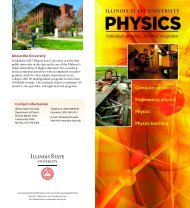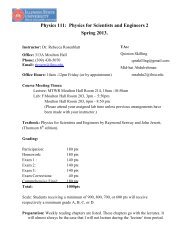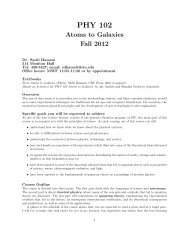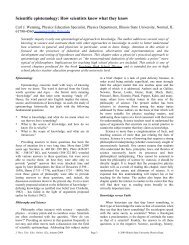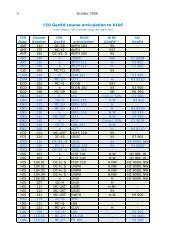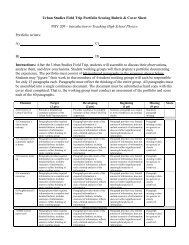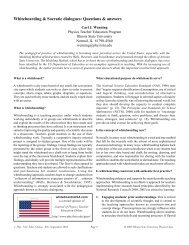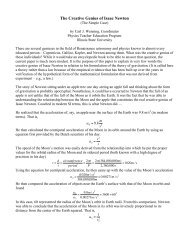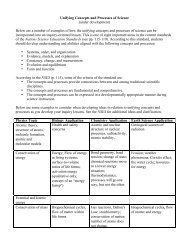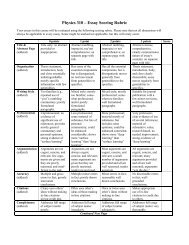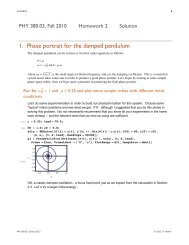Contrasting Cookbook with Inquiry-Oriented Labs - Illinois State ...
Contrasting Cookbook with Inquiry-Oriented Labs - Illinois State ...
Contrasting Cookbook with Inquiry-Oriented Labs - Illinois State ...
You also want an ePaper? Increase the reach of your titles
YUMPU automatically turns print PDFs into web optimized ePapers that Google loves.
<strong>Contrasting</strong> <strong>Cookbook</strong> <strong>with</strong> <strong>Inquiry</strong>-<strong>Oriented</strong> <strong>Labs</strong><br />
By Carl J. Wenning, Coordinator<br />
Physics Teacher Education Program<br />
<strong>Illinois</strong> <strong>State</strong> University<br />
Last updated 2/23/2004<br />
Traditional <strong>Cookbook</strong> <strong>Labs</strong><br />
Based on detailed set of instructions.<br />
Students follow step-by-step directions to conduct<br />
experiment.<br />
Questions, if present, tend to be leading questions – asking<br />
students to confirm an observation or make a calculation.<br />
Require minimum intellectual involvement.<br />
Lab strongly oriented toward gathering and interpreting<br />
numerical data.<br />
Student activity focuses on verifying information<br />
previously communicated in class.<br />
Confirmatory – follow class presentation of material.<br />
Generally little communication, and what exists tends to<br />
be one way – from teacher to student.<br />
Rarely incorporates learning cycles (observation,<br />
generalization, application).<br />
Students provided data tables <strong>with</strong> specified ranges for<br />
specific types of data.<br />
Tells student what data to collect.<br />
Students do not design experiment.<br />
Students communicate results only to course instructor<br />
through lab reports.<br />
Emphasis on completing task.<br />
Students generally do not provide explanations.<br />
Students generally do not predict, or predictions based<br />
upon known rules or laws.<br />
Students generally do not use inductive processes.<br />
Student questioning not encouraged or actively<br />
discouraged.<br />
Students are told which variables to hold constant, and<br />
which to vary, which are independent and which<br />
dependent.<br />
Students provided <strong>with</strong> a fixed instrumentation set up.<br />
Very little interaction between lab instructor and students.<br />
Students are directed to solve an instructor-identified<br />
problem or problems.<br />
Students told precisely how to analyze and interpret data.<br />
Promotes dependency.<br />
Employs lower-order thinking skills.<br />
Rule-conforming behaviors.<br />
Task often seen as boring.<br />
Focus on piecemeal understanding.<br />
Focus on completing tasks.<br />
Less time on task as students/teaching assistant often<br />
spend lots of time going over the instructions.<br />
Students tend to report “just the facts.”<br />
Authentic <strong>Inquiry</strong>-<strong>Oriented</strong> <strong>Labs</strong><br />
Based primarily on guiding questions.<br />
Students develop own experimental design.<br />
Many questions included in guidelines; questions are unbiased<br />
– asking students to merely report or draw own conclusions<br />
from evidence.<br />
Require ongoing intellectual engagement.<br />
Lab strongly oriented toward developing a strong conceptual<br />
understanding.<br />
Student activity focuses on discovering new concepts,<br />
principles, or empirical relationships.<br />
Discovery – serve to lead subsequent class discussion.<br />
Discussion driven by a series of intellectually engaging<br />
questions.<br />
Engages one or more complete learning cycles.<br />
Students determine what type of data and how much of it to<br />
collect.<br />
Leaves it up to the students to determine what data to collect.<br />
Students create experimental design on the basis of discovered<br />
principles.<br />
Students communicate and defend results to other participants<br />
in the lab session.<br />
Emphasis on achieving conceptual and scientific understanding<br />
using empirical data.<br />
Students asked to provide explanations adhering to rules of<br />
evidence.<br />
Students asked to generate predictions based upon deductive<br />
processes.<br />
Students asked to generate principles on the basis of inductive<br />
processes.<br />
Students, ideally, encouraged to ask questions and find answers<br />
to self-identified problems.<br />
Students identify, distinguish, and properly control pertinent<br />
independent and dependent variables.<br />
Students provided <strong>with</strong> a variety of technology and<br />
instrumentation but no fixed set up.<br />
Large amounts of question-drive interaction between lab<br />
instructor and students.<br />
Students identify problems to solved based on observations of<br />
unusual phenomena.<br />
Students use their own approaches to analyzing and<br />
interpreting data.<br />
Promotes independence of thought and action.<br />
Promotes higher-order thinking skills.<br />
Rule-creating behaviors.<br />
Task generally seen as engaging.<br />
Focus on holistic understanding.<br />
Focus on learning science.<br />
More time on task as there is a very brief introduction and<br />
students create their own instructional design.<br />
<strong>Inquiry</strong> questions form basis of lab report.
Experiment unlike the real thing.<br />
Questions to be investigated decided by the teacher<br />
What equipment to use, how to calibrate it, what data to<br />
collect, and how to organize data determined by teacher.<br />
Linear process that does not normally allow for repetition<br />
or for advising an experiment.<br />
Conclusion known ahead of time.<br />
Restrictive, mechanical, recipe-following, ruleconforming<br />
behaviors.<br />
Rarely requires familiarity <strong>with</strong> concept or principle being<br />
investigated.<br />
Lab driven by instructions.<br />
Student told which variables to control, manipulate, and<br />
observe.<br />
Students rarely draw conclusions from evidence.<br />
Discourages development of conceptual understanding of<br />
propositional and procedural knowledge.<br />
Tends to emphasize the quantitative aspects of a physical<br />
phenomenon to the exclusion of conceptual and qualitative<br />
understanding.<br />
Moves from abstract toward concrete.<br />
Assumes understanding.<br />
Lab approximates the methods of good science<br />
Questions, ideally, decided by the investigator.<br />
Investigators, ideally, have access to a variety of equipment<br />
and are responsible for appropriate use to collect pertinent data.<br />
Nonlinear process that allows for repetition and revision of<br />
experimentation.<br />
Discovery process uses empirical results to draw conclusion.<br />
Open-ended, dynamic, procedure-inventing, rule-creating<br />
behaviors.<br />
Requires students to become familiar <strong>with</strong> the concept or<br />
principle being investigated or accounted for.<br />
Lab driven by unanswered questions.<br />
Students identify and control pertinent variables (e.g.,<br />
dependent, independent, controlled)<br />
Students use inductive processes to draw conclusions.<br />
Promotes development of conceptual understanding of<br />
propositional and procedural knowledge – a prerequisite for<br />
conducting a lab experiment.<br />
Includes an emphasis on conceptual and qualitative analysis of<br />
physical phenomena.<br />
Moves from concrete toward abstract.<br />
Constructs meaning.


